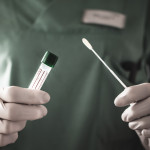The wily human papillomavirus (HPV) is the most common sexually transmitted disease, spreading from areas condoms ignore—like skin around the groin. It often shows no sign of infection but can cause genital warts. Women with weakened immune systems are especially vulnerable—and in one study, 77% of HIV positive women are already infected. Left untreated, some types of HPV cause cervical and anal cancers.
Pap smears have long been our best detectors, “but technicians might miss cell changes,” says Marie Savard, MD, a Philadelphia internist. Indeed, paps miss abnormalities up to 49% of the time. So researchers have invoked the ultimate ID: DNA. A DNA test for HPV is nearly 100% accurate—and most insurance covers it. The American College of Obstetricians and Gynecologists has urged women over 30 to order an HPV DNA/pap combo every three years. Savard suggests asking your gyno early if you’ve had an abnormal pap smear. “It ’s a fail-safe measure.”
A Smarter Smear
The better weapon against human papillomavirus






Comments
Comments